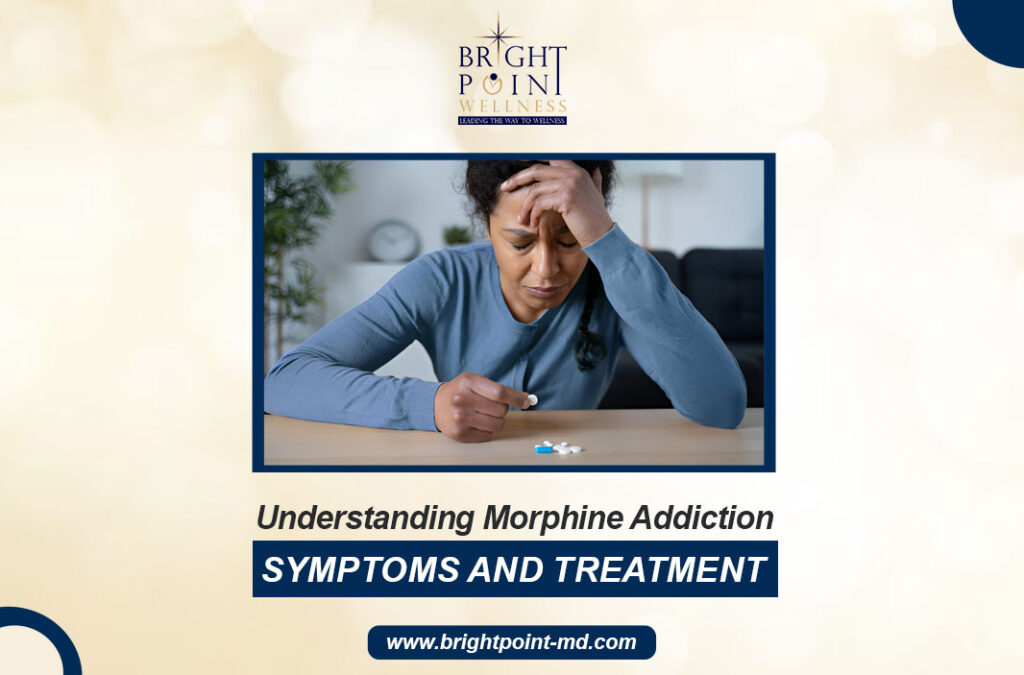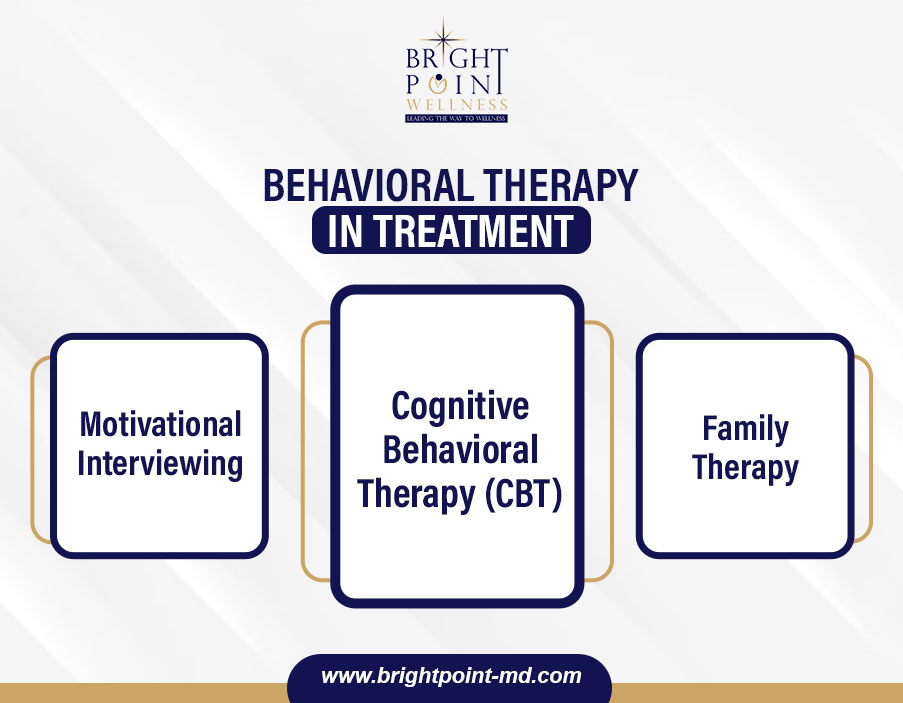
Morphine is a potent opioid drug commonly prescribed to treat severe pain, such as after major surgery or injury, by interrupting pain signals in the brain so that individuals feel relaxed. When used properly under a doctor’s short-term treatment plan, it can be highly effective at relieving acute distress.
Nonetheless, morphine may be extremely addictive, and it’s critical to recognize morphine addiction symptoms early on. Some individuals begin to depend on it not only for pain relief, but to feel good or to avoid feeling bad.
Over time, they may require increasing doses to achieve the same effect, which can lead to serious health disorders or even overdose. By understanding the warning signs, such as escalating tolerance, intense cravings, and withdrawal discomfort, you can seek help from medical professionals before dependence takes hold.
What Is Morphine Addiction?
Morphine addiction occurs when an individual is unable to quit the use of the drug despite its being problematic. Morphine numbs pain and makes individuals feel good through the alteration of brain chemicals. Once people start using it, after some time, the brain becomes dependent on morphine to experience normalcy.
It takes people increased amounts of it to produce an identical effect. They become ill when they discontinue its use abruptly. This causes them to desire to consume more, hence the cycle is difficult to break. That is why morphine is highly addictive.
How Morphine Addiction Develops
The addiction to the morphine process starts with a responsible medical prescription to relieve oneself of the pain following a surgery or an injury. Nevertheless, the persistence of its use even in the short term might cause an addiction in those individuals who are misusing the drug.
With repeated use of morphine, there is an alteration of the chemistry of the brain. The normal production of dopamine is slowed down, and the individual feels like having morphine as a way of feeling normal. This causes physical addiction and mental dependency.
Early Morphine Addiction Symptoms to Recognize
The early detection of morphine addiction symptoms will help avoid the aggravation of addiction. Early warning signs are:
- Using morphine in larger doses, or more frequently than directed
- Feelings of extreme craving or urges to take morphine
- Experience anxiety, restlessness, or irritability in the absence of morphine
- Mood swings, e.g., depression, irritability
- Memory/concentration issues
- Insomnia or excessive sleeping
These signs imply that the body of the individual is developing a morphine addiction.
Physical Symptoms of Morphine Addiction
As addiction advances, the physical signs of Morphine Addiction grow increasingly noticeable. These include:
- Slow, shallow breathing that has a life-threatening potential
- Frequent falling asleep or visible drowsiness throughout the day
- Pinpoint pupils
- Nausea, vomiting, or cramps
- Profuse sweating or bouts of chills
- Decreased appetite and marked weight loss
Evidence like this suggests a severe condition and demands prompt medical evaluation.
Behavioral Signs of Morphine Addiction
Morphine addiction symptoms influence a person’s behavior and everyday life. A morphine addict may:
- Camouflage or falsify their consumption of morphine.
- Distance themselves from family and friends
- Neglect obligations at either job or school
- Expend considerable sums to obtain morphine.
- Become moody, irritable, and aggressive.
Such conduct often ruins relationships and brings about monetary or legal complications.
Why Is Morphine Addiction Treatment Important?
Neglecting morphine addiction symptoms can trigger serious consequences. Left unchecked, addiction heightens the likelihood of an overdose, a result that can inflict permanent neurological harm or prove fatal. When morphine use is sustained over time, it damages the heart, liver, and kidneys as well.
Moreover, ongoing drug use aggravates psychiatric illnesses such as anxiety and depression. Robust morphine addiction treatment can avert death by disrupting the addiction cycle and furnishing individuals with the necessary skills to remain sober.
What Does Morphine Addiction Treatment Include?
Generally, treatment starts with a detoxification process supervised by healthcare professionals. Undergoing detox safely flushes morphine from the body while mitigating withdrawal symptoms, including muscle pain, sweating, nausea, and insomnia.
After a patient’s detoxification is complete, the administration of Medication-Assisted Treatment (MAT) may begin. Using MAT, therapists administer medications such as methadone, buprenorphine, and naltrexone to reduce cravings and lessen the symptoms of withdrawal. Such medications curb relapse by restoring balance to the brain’s chemistry. Bright Point-MD, both detox and MAT are tailored to each patient’s needs.
Behavioral Therapy in Treatment
Medication in isolation is inadequate. Counseling and behavioral therapy serve as essential components of the treatment. Some frequently encountered therapeutic interventions are:

- Cognitive Behavioral Therapy (CBT) assists patients in pinpointing their triggers while reshaping destructive thought patterns.
- Motivational Interviewing: Strengthens the motivation to remain drug-free.
- Family Therapy: Improves communication and works toward reinforcing relationships damaged by addiction.
Treatment can take place on an inpatient or outpatient basis, contingent on the seriousness of the addiction.
Coping with Withdrawal and Preventing Relapse
Although withdrawal symptoms can be severe, having medical support makes the detox process safer and more comfortable. Subsequently, therapy and ongoing support equip Morphine Addictive with the coping tools they need to forestall relapse.
Triggers like stress, social pressures, or physical discomfort must be dealt with very carefully. Bright Point MD guides patients through each stage of withdrawal and recovery with compassion and expertise.
The Role of Family and Friends
Over the course of recovery, it is vital to receive emotional support from family members and friends. Extending encouragement and understanding furthers treatment adherence. Loved ones can assist by:
- Sustaining a supportive atmosphere at home
- Assisting in keeping an eye out for relapse symptoms
- Nurturing healthy behaviors and strict attendance at therapy sessions.
Living a Life Beyond Addiction
Overcoming a morphine addiction entails more than simply avoiding the drug; it calls for forging a purposeful life. People on the road to recovery frequently discover past interests anew or pursue entirely fresh ones. By cultivating healthy habits, getting regular physical exercise, getting plenty of sleep, and eating a balanced diet, people build emotional stability.
Through the course of recovery, patients often rekindle bonds with loved ones while uncovering newfound meaning in their duties. With the Morphine Addiction and resolve to move forward, one can ultimately transcend addiction. Bright Point MD supports this journey by offering tools for personal growth and long-term recovery.
Final Thoughts
An addiction is hard. Yet there is still hope. Should you recognize the signs of morphine addiction, act without delay. Timely cure for Morphine Addiction tends to produce the most favorable outcomes.
You don’t have to suffer in silence. You’re not alone. Get help. Speak with someone. Opt for a better life.
Even when it is your battle or that of a loved one, recovery remains attainable. Recognizing the indicators is the beginning.
FAQs
What are the early signs of morphine addiction symptoms?
Early signs include craving, drowsiness, small pupils, and neglecting tasks.
Can someone become a morphine addict even if used medically?
Yes. Morphine is addictive, and dependence can start even under prescription.
How long does morphine withdrawal last?
Withdrawal peaks at day 2–4 and subsides over several days. Some symptoms last week.
What is the best morphine addiction treatment plan?
A plan includes detox, medication‑assisted treatment, therapy, and support groups.
Is there a cure for morphine addiction?
There is no instant cure. Recovery is a long journey with treatment and support.








